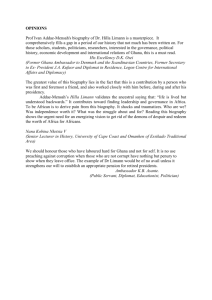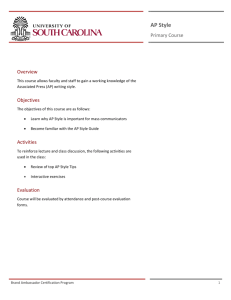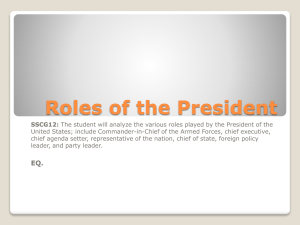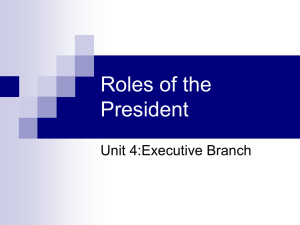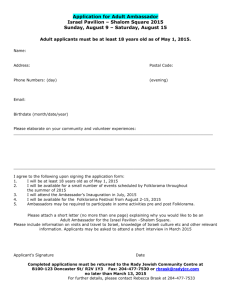Oral Remarks BY The Honorable Ambassador L Paul Bremer, Ill
advertisement
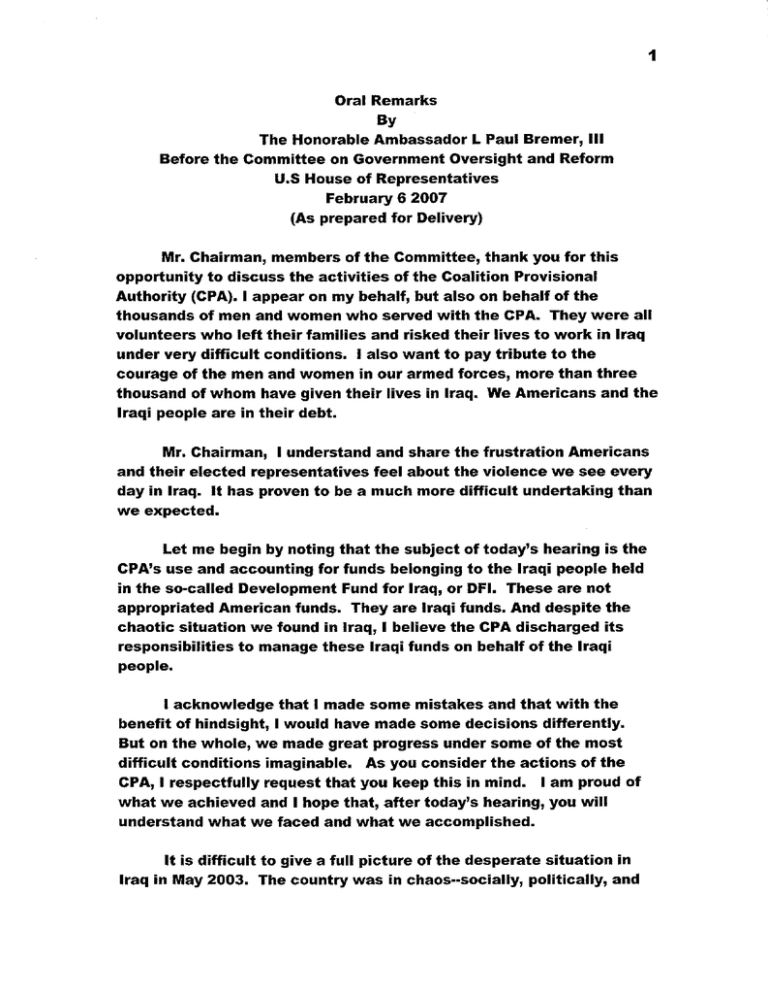
Oral Remarks BY The Honorable Ambassador L Paul Bremer, Ill Before the Committee on Government Oversight and Reform U.S House of Representatives February 6 2007 (As prepared for Delivery) Mr. Chairman, members of the Committee, thank you for this opportunity to discuss the activities of the Coalition Provisional Authority (CPA). Iappear on my behalf, but also on behalf of the thousands of men and women who sewed with the CPA. They were all volunteers who left their families and risked their lives t o work in lraq under very difficult conditions. Ialso want to pay tribute to the courage of the men and women in our armed forces, more than three thousand of whom have given their lives in lraq. We Americans and the lraqi people are in their debt. Mr. Chairman, Iunderstand and share the frustration Americans and their elected representatives feel about the violence we see every day in lraq. It has proven to be a much more difficult undertaking than we expected. Let me begin by noting that the subject of today's hearing is the CPAYsuse and accounting for funds belonging to the lraqi people held in the so-called Development Fund for lraq, or DFI. These are not appropriated American funds. They are lraqi funds. And despite the chaotic situation we found in Iraq, Ibelieve the CPA discharged its responsibilities to manage these lraqi funds on behalf of the lraqi people. Iacknowledge that Imade some mistakes and that with the benefit of hindsight, Iwould have made some decisions differently. But on the whole, we made great progress under some of the most difficult conditions imaginable. As you consider the actions of the CPA, Irespectfully request that you keep this in mind. Iam proud of what we achieved and Ihope that, after today's hearing, you will understand what we faced and what we accomplished. It is difficult to give a full picture of the desperate situation in lraq in May 2003. The country was in chaos--socially, politically, and economically. The deep crisis had been brought about not by war, nor by sanctions, but by the decades7-long corruption and incompetence of Saddam's regime. Among many other shocking facts: During the 1990s, Saddam cut health care spending by 90%. No new hospitals had been built in twenty years. More than half of the country7spublic health clinics were closed. Even before the war unemployment had been over 50%. Iraq's primitive banking system was shut down. The banks had no system for electronic transfer of funds. It was a cash-based economy. At the end of 2002 inflation was running at an annual rate of I 15,000%. In mid-2003, two reports, one by the U.S. Government Accountability Office, the other by Dr. John Hamre, President Clinton's Deputy Secretary of Defense, each compared the CPAystasks to those faced by the Allies after World War 11. The Special Inspector General for Iraq Reconstruction added, "There is no known precedent for an effort to manage the reconstruction of a nation on such a vast scale in the midst of danger and violence." To deal with this crisis, the CPA had the services of over 3,000 volunteers from 25 nations. Contrary to some reports, this was a remarkable and experienced group of men and women, as I show in an attachment to my statement. It was an honor to serve with them. Our top priority was to get the economy moving again. The reconstruction job proved to be harder than we anticipated because American prewar planning had not anticipated the enormity and difficulty of the tasks ahead of us. The first step was to get money into the hands of the lraqi people as quickly as possible. Under Saddam the lraqi government had been by far the country's largest employer, providing about four out of every five jobs. But for several months, since before the war, millions of lraqi families had not received money owed them for civil service salaries or pensions. We used the lraqi funds that are the subject of today's hearings to pay the Iraqis quickly. This was exceptionally difficult. First because lraqi ministries lacked good payroll records. Ideally we would have liked to put those records straight before beginning payments. But as so often in Iraq, the ideal collided with the harsh realities on the ground. We simply could not delay paying salaries and pensions. Delay would have been demoralizing and unfair to the citizens of lraq. Delay might well have exacerbated the nascent insurgency and thereby increased the danger to Americans. Using the lraqi funds to pay lraqi families was further complicated by the lack of an effective banking system. Banks were closed and in any event were unable to transfer funds electronically. So we had to pay Iraqis in cash wherever in lraq they lived. We also immediately put lraqi funds to work on large public works projects to create jobs. And we continued to pay Iraqis who had been employed in the State Owned Enterprises, even after they were closed down. Due t o a shortage of lraqi currency, many of these expenses were paid in American dollars drawn from the lraqi fund account. Let me turn to the question of CPA management of these lraqi government funds. My colleagues and Ifully understood our responsibility for the temporary stewardship of these lraqi moneys. We took seriously our charge to operate in an open and transparent fashion and to use these lraqi funds in the best interests of the lraqi people. We always strived to meet those objectives, and where we may have fallen short, Iaccept responsibility. Iunderstand the Committee's concern about the manner in which contracts were awarded using lraqi funds. It is important to understand that, although Iwas the Administrator and accept full responsibility for the missions assigned to the CPA, Idid not have authority over the awarding of contracts. Before Ileft for iraq, the Pentagon designated the Department of the Army as the executive agent for the CPA, including "management oversight for the acquisition and contracting support.'' The Army's contracting responsibilities extended to both the lraqi funds and the appropriated funds. Therefore Iregret that Imay not be able to answer your specific questions about individual contract decisions. Let's be clear what we are talking about here. Some press stories allege that the Special Inspector General's January 2005 report found that the CPA wasted, or even stole, lraqi funds. Yet when he appeared before this Committee in June 2005 to discuss his audit report, the Special lnspector General stated that "There have been some misinterpretations about exactly what we said, so let me be clear about what the audit did not say. It did not say that the money was lost. It did not say that the money was stolen. It did not say that the money was fraudulently disbursed by U.S. authorities." Indeed, the Special lnspector General and the United Nations each concluded that CPA had properly disbursed lraqi funds from the Development Fund to the lraqi Ministries. The core difference between the Special lnspector General and the CPA turns largely on how the Iraqis handled the money-their money-after we disbursed it to them. For the Special lnspector General's report implies that we should have gone much further, seeking to impose modern financial control systems on the disbursement of these lraqi funds by lraqi ministries themselves--and this in less than a year, on a failed state in the middle of a war. Iknow of no one who spent meaningful time in Baghdad working with the lraqi ministries who thought this was possible in the conditions under which we worked. Here too the ideal conflicted with the reality we faced. We had to find a way to get the lraqi people's money working quickly for them rebuilding their country. As was the case with the salaries and pensions, we could not wait to install modern financial systems in the ministries. A team of experts from the International Monetary Fund found that the existing lraqi systems were adequate and recommended we use them while beginning the longer term process of modernizing them. We agreed and so disbursements from the lraqi Development fund were made t o the lraqi ministries according to procedures and controls spelled out in CPA regulations. The ministries used existing lraqi systems to carry out their responsibility for the proper use of those funds. It was not a perfect solution. But there were no perfect solutions in Iraq. Let me say, Mr. Chairman, that Iregularly visited the lraqi Ministry of Finance, Ministry of Planning, other Ministries and the country's central bank. Isaw at first hand the primitive systems which the lraqi civil sewants were struggling with. Most ministries did not even have computers but kept their records on handwritten spread sheets. While Iam certainly not a financial expert, my personal observations convinced me that the experts from the International Monetary Fund and the CPA were correct in judging that we could not expect rapidly to modernize those systems i n the middle of a war. There was also a political dimension to our decision to use the existing lraqi financial systems. The Coalition's strategy, and the intent of the international community expressed in United Nations Security Council resolutions, was to give the Iraqis responsibility quickly. This was after all their money, to be used for the benefit of the lraqi people. When lraqi ministers were appointed by the Iraqis on September 3 2003, 1 made clear that it was their responsibility to develop and execute their ministry budgets. My colleagues and Iwere acutely aware of the dangers of corruption. It had been institutionalized, even encouraged, under Saddam, as the Oil for Food program has shown. So we took steps to combat corruption. We established the independence of the lraqi judiciary, appointed Inspectors General in every lraqi ministry, revitalized an old respected lraqi audit agency and set up a national commission to which any lraqi can bring charges of fraud or waste. Of course these institutions alone, in a short time, cannot abolish corruption. But a start has been made. Icommend the Committee's intention to see what lessons can be learned from these experiences. Iwould offer several for your consideration. First, there is no substitute for good planning. The Executive Branch has taken steps in the past couple of years to improve its ability to cope with post-conflict situations. Ihope Congress will support these. Second, a "business as usual" approach to both contracting and personnel severely hampered our ability to begin the massive job of reconstructing Iraq. The Special Inspector General has developed useful ideas for processes in contracting and personnel which Icommend to the attention of the Committee. Attachment to Testimony of Ambassador L. Paul Bremer, III February 6, 2007 List of Top Officials of Coalition Provisional Authority Deputy Administrators, Coalition Provisional Authority Ambassador Clayton McManaway: Career diplomat. Ambassador Richard Jones: Career diplomat. Ambassador to Lebanon, Kuwait and Kazakhstan under President Clinton. Fluent in Arabic. Ambassador John Sawers: Career British diplomat, served concurrently as British Ambassador to Egypt. Fluent in Arabic. Ambassador Jeremy Greenstock: Career British diplomat, formerly British Ambassador to the U.N. Lt. Gen. Keith Kellogg: Retired career Army officer. VAdm Adm. Scott Redd: Retired career Navy officer. Lt. Gen. Jeff Oster: Retired career Marine officer. Hon. Reuben Jeffery: Former Goldman Sachs international banker. Currently Chairman of the Commodity Futures Trading Commission. Chief of Staff Ambassador Patrick Kennedy: Career diplomat. Stephen Smith: Career diplomat. Chief Financial Officer Al Runnels: over 30 years service in financial management, financial services and comptroller positions in the U.S. Department of Defense Col. Erik Engelbrektsson: 28 years of experience in financial management at the U.S. Department of Defense; service in Bosnia and as Deputy Comptroller in the Defense Logistics Agency. Director of Operations Andrew Bearpark: A veteran overseas development and humanitarian assistance aid official for the British government. Prior postings included Bosnia and Kosovo Head of Program Management Office V Adm. David Nash: Four decades experience in building, design and program management with the U.S. Navy and the private sector. General Counsel BGen. Scott Castle: Career Army officer, deputy legal counsel, Department of Defense. Principal Deputy General Counsel, Department of the Army. Senior Advisor for Congressional Affairs Tom Korologos: Three decades experience in Congressional relations. Senior Political Advisers Ambassador Hume Horan: Retired career diplomat. Former ambassador to Cameroon, Sudan and Saudi Arabia. Fluent in Arabic. Ambassador Chris Ross: Retired career diplomat, ambassador to Syria in the Clinton administration. Fluent in Arabic. Ambassador Ryan Crocker: Career diplomat, ambassador to Kuwait and Lebanon in the Clinton administration. Fluent in Arabic. Ambassador Ronald Neumann: Career diplomat. Previously ambassador to Bahrain. Fluent in Arabic. Ambassador Ron Schlicher: Career diplomat. Previously U.S. consul general in Jerusalem. Fluent in Arabic. Special Assistant for Speechwriting and Polling Don Hamilton: Retired career diplomat. 2 Policy Planning Dayton Maxwell: Career U.S. Agency for International Development (USAID). Andrew Rathmell: Economist with RAND (nonpartisan think tank). Other Political Advisers Mike Gfoeller: Career diplomat. Head of CPA office in central Iraq. Fluent in Arabic. Ambassador Olewoehler Olsen: Career Danish diplomat. Head of CPA office in southern Iraq. Former ambassador to Saudi Arabia and Syria. Fluent in Arabic. Sir Hilary Sinnott: Career British diplomat. Second head of CPA office in southern Iraq. Fluent in Arabic. Col. Richard Naab: Head of CPA office in northern Iraq. Retired career Army officer. Herro Mustafa: Career diplomat. Second head of CPA office in northern Iraq. Fluent in Arabic and Kurdish. Jules Chappell: Career British diplomat. Fluent in Arabic. Irfan Siddiq: Career British diplomat. Fluent in Arabic. Raad Alkadiri: Iraqi-British citizen. D.Phil. in International Relations from Oxford University, native Arabic speaker. Tom Warrick: Career diplomat. Fluent in Arabic. Scott Carpenter: Deputy Assistant Secretary of State for Democracy, Human Rights and Labor. Worked for the International Republican Institute on democratization projects in Eastern Europe. Meghan O'Sullivan: Ph.D. from Oxford, worked at the Brookings Institution. State Department Policy Planning Office prior to service in Iraq. Roman Martinez: Department of Defense. 3 Senior Advisers for Oil for Food Project Ambassador Steve Mann: Career diplomat, ambassador to Turkmenistan during Clinton Administration. Jim Warlick: Career diplomat. Senior Project Manager for Currency Exchange Gen. Hugh Tant: Retired career Army officer. Senior Advisers to Iraqi Ministries Ministry of Agriculture Trevor Flugge: Australian wheat and livestock farmer; chairman of the Australian Wheat Board. Lloyd Harbert: Career employee of U.S. Department of Agriculture. Peter King: Career employee of Australian Department of Agriculture. Ministry of Communications Jerry Thames: 28-year career at AT&T and BT North America. Dan Sudnick: 2001-03 with Cantabs Inc., a trade and technology investment company. Ministry of Culture Ambassador Mario Bondioli Osio: Retired Italian diplomat. Ambassador Pietro Cordone: Retired Italian diplomat. Born in Egypt. Ambassador to Yemen and the United Arab Emirates. Fluent in Arabic. John Russell: Massachusetts College of Art; archeologist and art historian. Ministry of Defense Walter Slocombe: Undersecretary of defense for policy during the Clinton administration. David Gompert: Annapolis graduate, career Navy officer; president of RAND Europe from 2000 to 2003 and director of the National Defense Research Institute from 1993 to 2000. 4 Fred Smith: Career civil servant. Department of Defense and State Department. Ministry of Displacement and Migration Jennifer Johnson: Career diplomat. Jose Lamego: Former Portuguese foreign minister and member of the Socialist Party of Portugal. Larry Bartlett: Career civil servant in the Department of State. Susan Johnson: Career diplomat. Ministry of Education Williamson M. Evers: Former education policy adviser to George W. Bush during the 2000 presidential campaign; research fellow at the Hoover Institution. Leslye Arsht: Counselor to Secretary of Education Lamar Alexander. Former associate vice chancellor at Vanderbilt University and deputy press secretary to President Reagan. Dorothy Mazaka: USAID employee. Ministry of Electricity Pete Gibson: Army Corps of Engineers. Col. Randy Richardson: U.S. Army Reserves. Col. Steve Browning: Serving officer, Army Corps of Engineers. Jimmy Hicks: Former executive with Duke Power. Ministry of Environment Col. H. Allen Irish: Serving officer, U.S. Army. Ed Theriot: Director of the Environmental Laboratory at the U.S. Army Engineer Research and Development Center. Career member of the Federal Senior Executive Service. 5 Ministry of Finance Marek Belka: Former Deputy Prime Minister and Minister of Finance of Poland. Subsequently Polish Prime Minister. Peter McPherson: President of Michigan State University. Former administrator of USAID. RAdm. David Oliver: Retired naval officer. Former Principal Deputy Undersecretary of Defense in Clinton administration. Anthony McDonald: Career civil servant with Australian Treasury Department. David Nummy: Senior adviser for budget policy and management in the U.S. Treasury Department; staff member of the Senate Budget Committee, and assistant secretary for management of the U.S. Department of the Treasury. Rodney Bent: Career Office of Management and Budget official and professional staff member on the House Appropriations Committee, Foreign Operations Subcommittee. George Wolfe: Former law clerk to Judge Donald Russell, Fourth U.S. Court of Appeals. Deputy General Counsel to the U.S. Department of the Treasury, 2001-04. Olin Wethington: Former Assistant Secretary for International Affairs at the U.S. Treasury and executive secretary, White House Economic Policy Council. Ministry of Foreign Affairs Ambassador David Dunford: Career diplomat; ambassador to Oman during the Clinton administration. Susan Johnson: Career diplomat. Steve Seche: Career diplomat. Marc Sievers: Career diplomat. Ministry of Health Col. Steve Browning: Serving officer, Army Corps of Engineers. James Haveman: Former director of the Michigan Department of Community Health and director of the Michigan Department of Mental Health. 6 Ministry of Higher Education Dr. Andrew Erdmann: State Department policy planning staff responsible for counterterrorism, homeland security, and Central Asian policy. Previously a historian at Harvard. Dr. John Agresto: Former president of St. John's College. Doctorate in political science from Cornell University. Ministry of Housing and Construction Dan Hitchings: Chief of engineering and construction at the Army Corps of Engineers' Pittsburgh district. Jack Rintoul: Civil Engineer, Army Corps of Engineers. Lt. Col. Joseph Morgan: U.S. Army. Served in Bosnia during Clinton administration. Mike Karem: Former Deputy Assistant Secretary of Housing and Urban Development. Ministry of Human Rights Audrey Glover: British career diplomat. Former head of British delegation to the U.N. Commission on Human Rights. Sandy Hodgkinson: Human rights specialist with the State Department. Navy Reserve Judge Advocate officer, worked as a military prosecutor and an instructor in crimes against humanity issues. Career member of the civil service. Ministry of Industry and Minerals Ambassador Tim Carney: Career diplomat. Ambassador to Sudan in the Clinton administration. Rick Ortiz: Career diplomat. Lt. Col. Brad Jackson: U.S. Army (Reserves). Col. Lettie Bien: U.S. Army (Reserves). Ministry of Interior Robert Gifford: Policing expert from the U.S. Department of State who also served as an adviser in Afghanistan. Career member of the Senior Executive Service. Bernard Kerik: Former chief of police in New York City. Doug Brand: British. Chief constable, Yorkshire Police. Career law enforcement officer. 7 Steven Casteel: 32-year veteran of the Drug Enforcement Agency. Brig. Gen. James Steele: Retired U.S. Army officer. Ministry of Justice Clint Williamson: Former director of the Justice Department at the U.N. Mission in Kosovo during the Clinton administration. Maj. Gen. Donald F. Campbell: Serving judge on the Superior Court of New Jersey; and a major general in the U.S. Army Reserves. Edward Schmults: Former deputy attorney general of the U.S. Ministry of Labor and Social Affairs Karen Walsh: USAID employee. Chris Spear: Assistant secretary for policy, U.S. Department of Labor. Lt. Col. Jim Otwell: U.S. Army, civil affairs officer. Bob Gross: Attorney. Former general counsel and president of First Interstate Bank of Utah. Chief of staff to Gov. Mike Leavitt in 1997. Ministry of Municipalities and Public Works Michael Mutter: senior architectural and physical planning adviser at the British Department for International Development. Ministry of Oil Philip Carroll: Former chief executive of the U.S. division of Royal Dutch-Shell. Robert McKee: Former Conoco-Phillips executive. Gary Vogler: Former executive with Exxon Mobil. Mike Stinson: Former executive with Conoco-Philips. Ministry of Planning and Development Simon Elvy: British career diplomat. Neil Hawkins: Former member of the Australian army, Regional Force Surveillance Units. 8 Ministry of Private Sector Development Thomas Foley: Founder and Chairman of the NTC Group Inc., an investment firm specializing in long-term equity investments in operating companies. M.B.A. from Harvard. Mike Fleischer: President and member of the Board of Directors of Bogen Communications International, which makes telecommunications systems. M.B.A. from Harvard. Ministry of Trade Ambassador Robin Raphel: Career diplomat. Former U.S. ambassador to Tunisia and assistant secretary of state for South Asia during the Clinton administration. R. David Luft: Department of Commerce employee. Lt. Col Tracey Wright: Construction engineer in the U.S. Army. Sue Hamrock: Career employee of the Department of Commerce. Ministry of Transportation Darrell Trent: Chairman and CEO of Acton Development Co.; acting secretary of transportation under President Reagan. Ministry of Water Resources Eugene Stakhiv: U.S. Army Institute for Water Resources. Jerry Webb: U.S. Army Corps of Engineers, principal hydrologic and hydraulic engineer. 30 years experience in water resources field. Ed Theriot: Director of the Environmental Laboratory at the U.S. Army Engineer Research and Development Center. Member of the Federal Government Senior Executive Service. Ministry of Youth and Sport Don Eberly: Founder of the National Fatherhood Initiative and the Civil Society Project, former deputy director of the White House Office of Faith Based and Community Initiatives. Mounzer FatFat: A native of Lebanon. During the Clinton administration established sports and entertainment programs for Kosovo's youth under U.N. auspices. 9

